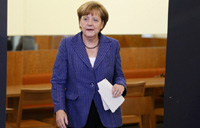Europe's mainstream parties stunned by election results
Updated: 2014-05-27 10:11
(Xinhua)
|
|||||||||||
For the far-right parties, it would seem that voters were not even particularly attracted by the rhetoric of restoring powers from the European institutions back to national parliaments. Instead the overriding issue was immigration.
|
 European elections reflect consensus at EU level |
At the opposite end of the political spectrum, support for far-left parties, such as Alexis Tsipras's Syriza, owed their success to the anti-austerity ticket on which they ran.
Nevertheless, the results have obvious implications for the composition of the new EP when MEPs (members of European Parliament) take up their seats in July. In the interim, weeks of deals between the various groupings will take place, with a meeting of the European Council on June 26-27 playing a crucial role in the horse trading over who becomes the next President of the European Commission (EC). Before then, in fact on Tuesday European heads of government will meet informally over dinner to discuss the results.
Projections show the centre-right European People's Party (EPP) will still be the largest single party in the new parliament, probably with 213 MEPs. The centre-left Socialists and Democrats (S &D) group should get 190 MEPs.
Meanwhile a forecast collapse for the liberal ALDE party did not materialize, despite terrible nights for the group's British and German member parties. ALDE remains in third place possibly getting some 66 MEPs, while the Greens should have 54, the European Conservatives and Reformists (ECR) 46 and the far-left GUE projected to have 42 MEPs.
But, the EPP will not get an outright majority in a simple coalition with ALDE, its previously favored alliance. It would also have to lure the ECR into a wider centre-right coalition if that is the party's chosen direction.
However, as the ground-shaking results were picked over by analysts throughout Monday, attention turned to the prospect of a "grand coalition" between the EPP and S&D. The two will likely hold over 400 seats in the new, 751-member Parliament, comfortably above the absolute majority threshold of 376. An absolute majority is required for confirmation of the next EC President, and for the new college of EC commissioners.
In the EP, unlike many national parliaments, such a fusion would not be out of place. The EPP and S&D are used to working and compromising with each other over complex legislation. Both groups, along with the Liberals and the Greens, are, of course, overwhelmingly pro-EU, and so have common interest in fighting for the European cause in the face of opponents on the far-right and far-left who would dismantle the entire project given the opportunity.
Related Stories
European elections reflect consensus at EU level 2014-05-26 09:55
New momentum for anti-EU party in UK 2014-05-24 08:03
EU-wide elections could roil the bloc 2014-05-23 07:10
Moscow accuses Kiev, EU of hindering solution to Ukraine crisis 2014-05-19 21:07
Silk Road economic belt highlights China-EU cooperation 2014-05-13 13:32
Skeptics set to fight EU from inside after voting 2014-05-12 07:23
Today's Top News
Russia bans 'historically false' WWII movie
Egypt extends presidential vote
'Homemade electricity' creates buzz
UK debates on its EU membership
Fighting kills 40 in east Ukraine
Britain encourages more students to study, work in China
Ukraine to pay gas debt to Russia
Parties stunned by EP election results
Hot Topics
Lunar probe , China growth forecasts, Emission rules get tougher, China seen through 'colored lens', International board,
Editor's Picks

|

|

|

|

|

|





